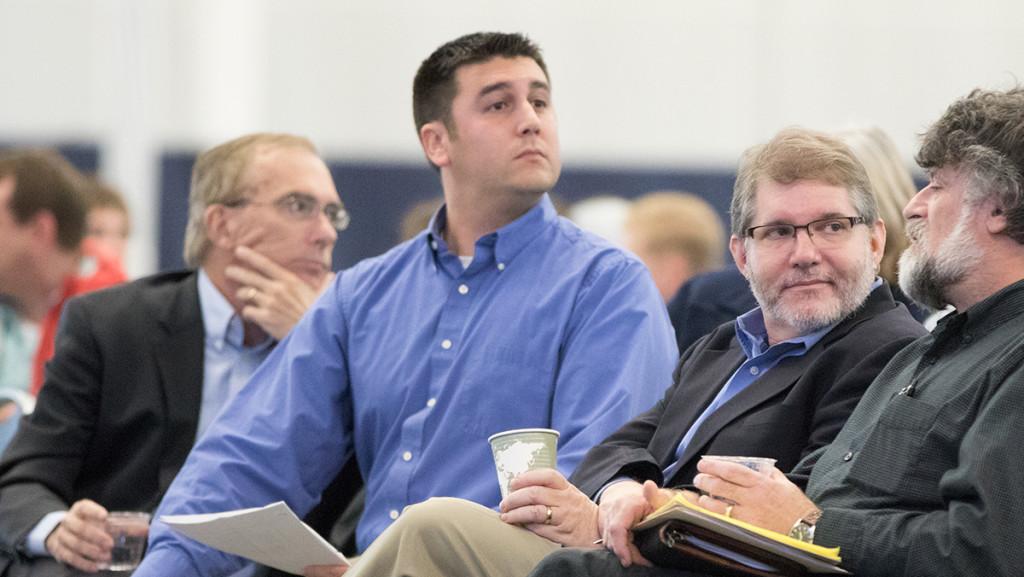The Ithaca College Staff Council will be holding a vote of no confidence in President Tom Rochon.
After the Staff Council meeting Dec. 17, Sean Reilley, the chair of Staff Council, said, the council will be moving forward with a vote of no confidence in Rochon.
The vote opens today, Dec. 17, and will run through Jan. 15, Reilley said.
Reilley declined to comment further, saying he needed time to collect his thoughts and put things together in a more organized fashion.
The staff vote comes following a faculty vote of no confidence, in which 316 faculty members — 77.8 percent of those who voted — expressed no confidence. Of eligible faculty members, 86.5 percent voted. It also follows a semester of on-campus protests calling for Rochon’s resignation and a student no confidence vote that resulted in 71.75 percent of voters voting “no confidence,” with 3,756 students of the 6,907 students it was sent to responding to the poll.
Maura Stephens, associate director of the Park Center for Independent Media, said she thinks some members of the staff have not spoken up until now because it is difficult for them to get together and decide on a consensus. She said Staff Council meets once a month, but otherwise staff are scattered around campus and have little time to interact.
Stephens also said she thinks there is a level of fear in some staff members that hinders them from speaking out. She said with the announcement of 40 potential staff cuts at the beginning of the 2015–16 school year, some staff members have been “walking around with a feeling of dread and fear.” She said she believes this may affect the staff voting results.
Tanisha Malone, human resources operations coordinator, said it’s important that staff voice their opinions so the students know they are not alone.
“Our purpose is to serve students and enrich their lives,” Malone said. “If the students should see that there are issues and they need a voice and they want to get that out there and no one’s listening, that’s a problem. That means we’re not doing our jobs. We also have issues, and they’re a little bit different than the students’, but the genesis began with the students.”
Staff survey results released Dec. 15 revealed how the staff feels about the atmosphere on campus. A majority of the respondents, 56.07 percent, said they have either low or semi-low morale. Additionally, 63.92 percent said they felt there was either low or semi-low morale within their departments. Of the respondents, 40 percent said racism exists somewhat on campus, and 22.14 percent said it was prevalent on campus.
The survey also asked about accountability on campus. The majority of respondents, 69.28 percent, said there is a lack of accountability for actions and decisions made on campus. Fifty-five percent of respondents pinpointed this lack of accountability to the upper administration.
Stephens said much of the atmosphere on campus may be due, in part, to the loss of many staff training, leadership and bonding programs. Over the 18 years she has worked at the college, she said she has seen many of such programs that allowed her to meet other staff members disappear.
Don Austin, assistant director for community service and leadership development at the Office of Student Engagement and Multicultural Affairs, said although he has only been at the college for five years, he has noticed some developmental issues. He said while there is a clear effort on campus to change the atmosphere, certain areas that need fixing are not receiving enough attention. He said there is a lack of voices, resources and staff in various well-meaning attempts to better the college.
For example, Austin said the Office of Civic Engagement, which just received new office space this year, has potential, but it needs proper resources and commitment in order to effectively do its job. He said the college’s approach to this office has affected its ability to schedule service learning courses for faculty, offer more cultural competency programs for students and get the word out about what civic engagement is.
“We’re not doing the things necessary in a lot of cases to help some of those efforts realize their fullest potential,” Austin said.









